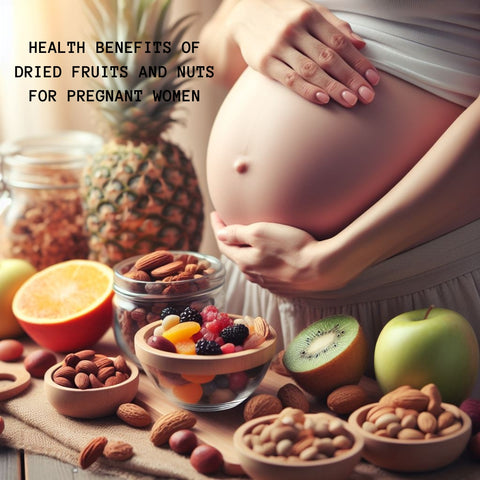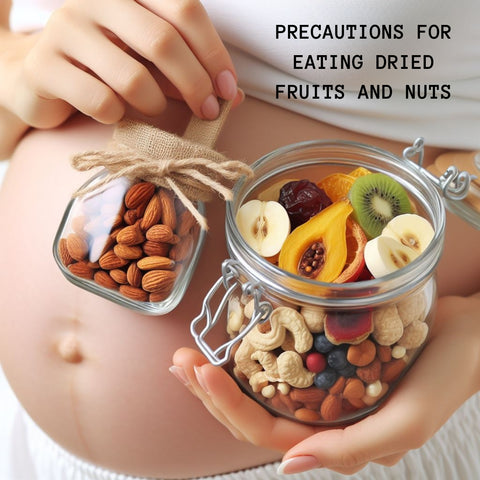Benefits of Eating Dried Fruits and Nuts During Pregnancy
When it comes to nourishing yourself during pregnancy, incorporating dried fruits and nuts into your diet can be like hitting two birds with one stone. Being pregnant means happiness for every woman. At the same time, this state is a challenge for your health. You must think about the unborn child’s health, therefore a healthy diet during pregnancy becomes your main concern. Your dietary choices are very important, and it’s preferable that they cover a great variety of foods. Foods for a pregnant woman should contain the necessary nutrients such as minerals, vitamins, proteins, and fiber in sufficient quantities to satisfy you and your developing child’s needs. Fortunately, there are two kinds of foods that completely meet these requirements – dried fruits and nuts.
The benefits go beyond just satisfying cravings; they play a vital role in supporting your overall health and that of your growing baby. From providing essential nutrients to aiding in digestion, the advantages of including these power-packed snacks are abundant. But there's more to discover about how these simple additions can make a significant difference in your pregnancy journey.
Health Benefits of Dried Fruits and Nuts for Pregnant Women

When you're pregnant, dried fruits and nuts can offer you essential nutrients like fiber, protein, iron, copper, calcium, magnesium, and manganese. They provide a convenient and healthy way to boost your intake of these vital nutrients, helping support your health and the development of your baby. Incorporating a variety of dried fruits and nuts into your diet can contribute to a well-rounded and nutritious pregnancy.
1. Fiber: Boost your fiber intake during pregnancy by incorporating dried fruits and nuts into your diet for various health benefits. Fiber is crucial for maintaining healthy digestion and preventing constipation, a common issue during pregnancy. Fiber also helps prevent accelerated weight gain and regulates blood pressure. Nuts with brown coats are especially rich in this nutrient. These are almonds, hazelnuts, brazil nuts, and walnuts.
Dried fruits like prunes, figs, and apricots are excellent sources of fiber. They can help regulate your bowel movements and keep your digestive system running smoothly. Nuts such as almonds, walnuts, and pistachios also contain fiber, aiding in digestion and providing a feeling of fullness.
2. Protein: To further enhance your pregnancy diet with dried fruits and nuts, consider the protein benefits they offer to support your overall health during this crucial time.
Protein is essential for the growth and development of your baby and helps in repairing tissues in your body. Dried fruits and nuts, especially almonds, walnuts, pistachios, coconuts, and dates are rich sources of protein. Therefore, their consumption will be beneficial during pregnancy.
Including a variety of dried fruits and nuts in your diet can help you meet your daily protein requirements, aiding in the healthy development of your baby and keeping you strong during pregnancy.
3. Iron: Enhance your iron intake during pregnancy by incorporating dried fruits and nuts into your diet. Iron is crucial for the production of hemoglobin, which helps transport oxygen to your baby.
Iron helps your body produce more blood and consequently hemoglobin, which provides the fetus with oxygen. Dried dates, raisins, coconuts, apples, walnuts, and especially goji berries are rich sources of iron. Nuts such as almonds and cashews also contain iron and can be a convenient snack to boost your intake.
Including these nutrient-dense foods in your diet can help prevent iron deficiency anemia, which is common during pregnancy. Remember to consult your healthcare provider for personalized advice on incorporating dried fruits and nuts into your pregnancy diet.
4. Copper: Incorporating dried fruits and nuts into your diet during pregnancy can provide a rich source of copper, essential for various physiological functions in both you and your baby. Copper is crucial for the formation of your baby's heart, blood vessels, and nervous system. It also aids in the development of your baby's brain and helps with iron absorption, which is vital during pregnancy.
Additionally, copper plays a role in maintaining your immune system and supporting the growth of healthy connective tissues. By including dried fruits and nuts like apricots, prunes, almonds, and cashews in your diet, you can help ensure that you're meeting your copper needs for a healthy pregnancy and optimal development of your baby.
5. Calcium, magnesium, and manganese: Ensuring an adequate intake of dried fruits and nuts during pregnancy can significantly contribute to meeting your calcium, magnesium, and manganese needs, essential for supporting your overall health and the development of your baby. The development of the skeleton, muscles, nerves, and ligaments in the fetus would be impossible without these important minerals. They are found in abundant quantities in both dried fruits and nuts, which makes them the best foods for pregnant women.
Calcium is crucial for bone and teeth formation in your baby, while magnesium aids in muscle function and regulates blood sugar levels. Manganese plays a role in forming your baby's bones and cartilage. Dried fruits like figs and apricots are rich in calcium, while nuts such as almonds and cashews provide magnesium. Manganese can be found in nuts like hazelnuts and pecans.
Including a variety of dried fruits and nuts in your diet can help ensure you meet these important mineral requirements for a healthy pregnancy.
6. Vitamins: Meeting your calcium, magnesium, and manganese needs through dried fruits and nuts is just the beginning; now let's explore the vital role vitamins play in supporting your health during pregnancy.
Vitamins are essential for various bodily functions and play a crucial role in your baby's development. Dried fruits like apricots and prunes are rich in vitamin A, vital for your baby's eyesight and immune system. Nuts such as almonds and walnuts are excellent sources of vitamin E, which helps in the development of your baby's brain and red blood cells.
Additionally, dried fruits like raisins provide a significant amount of vitamin K, essential for proper blood clotting. Including a variety of dried fruits and nuts in your diet can ensure you receive the necessary vitamins for a healthy pregnancy.
Precautions for Eating Dried Fruits and Nuts
Keep in mind that nuts are high in fat and calories, so it’s better to consume them in their natural state, without frying them. Dried fruits are also caloric. That’s why, eat them in moderation – stick to one handful of dried fruits or nuts a day. Choose “sundried fruits”, i.e., those that have been dried naturally. Fruits that have been processed in a plant may contain acrylamide, a toxin that is formed in foods if they are heated for a long time. It affects the nervous system and fertility. Be aware of sulfur dioxide, a preservative that makes dried fruits look nicer. It can be dangerous for people prone to allergies. Buy organic fruits and nuts, which are free from possibly harmful substances.
Several Ways to Consume Dried Fruits and Nuts
To incorporate dried fruits and nuts into your diet during pregnancy, consider adding them to your morning oatmeal or yogurt for a nutrient-rich boost. Snack on a handful of mixed nuts and dried fruits for a quick and satisfying energy pick-me-up. You can also sprinkle chopped nuts and dried fruits over salads to add crunch and sweetness. Blend dried fruits and nuts into smoothies for a delicious and filling treat.
Create your own trail mix by combining your favorite dried fruits and nuts for a convenient on-the-go snack. Experiment with baking by including chopped nuts and dried fruits in muffins, cookies, or bread for added flavor and nutrition. Enjoy the versatility and health benefits of incorporating dried fruits and nuts into your daily meals.
